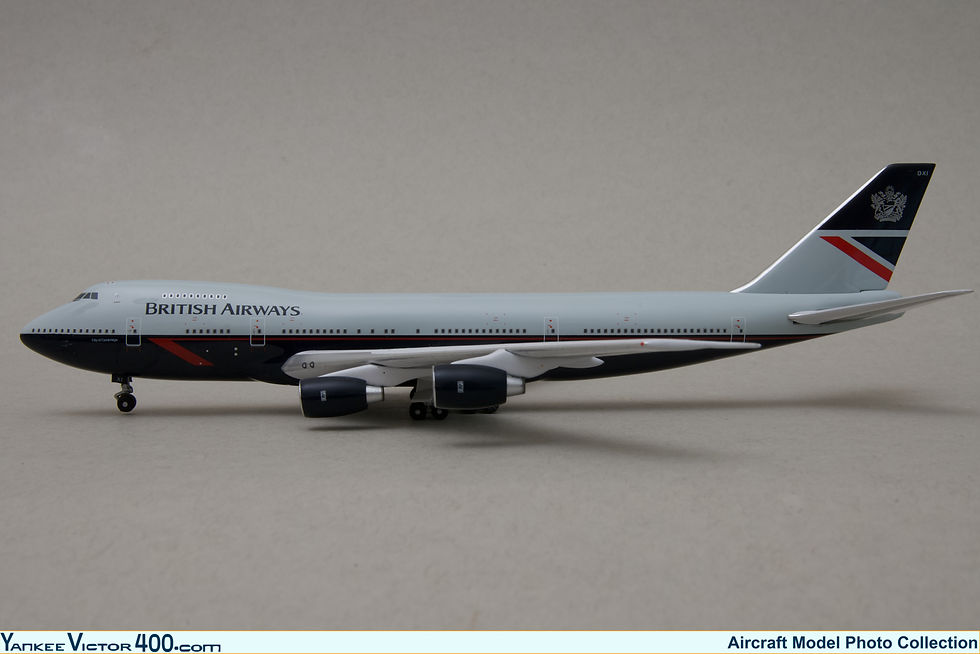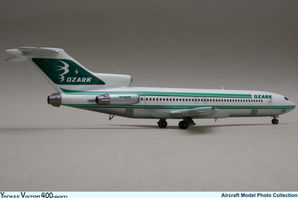Recently, Phoenix Models announced the release of three British Airways 747s in 1:400 scale. A -136 (G-AWNP), a -236B (G-BDXO), and a -436 (G-BNLC). The Phoenix 747-100/200 and -400 molds in 1:400 scale are widely criticized. Some of the faults that have earned the molds their bad rap are well documented by Richard Stretton in an article on his site Yesterday's Airlines. But, are those faults enough of a reason for collectors to blindly ignore every 741/2/3/4 model that Phoenix releases in 1:400 scale? And, can't similar faults be found on other 1:400 scale molds that are not criticized as widely as the Phoenix 747s? Hopefully, you will have your own answer to the first one of those questions after reading through this write-up. As far as the second question goes, I honestly don't know the answer, nor do I plan on trying to find it, but I thought it would be good food for thought.
Out of the three recent British Airways Landor c/s releases by Phoenix Models I added two to my collection (the -136 and the -236) during a visit to Airplane Models @ SG (highly recommended!). I did pass on the -436, but mainly due to a printing issue that I saw on a picture, and taking into account that I already had a very nice example of the same type/livery combo.
So, how do the -136 and -236B produced by Phoenix look? Well, obviously they looked good enough to me as I ended up dropping some cash for them, but here I will offer some comparison shots for you to make your own conclusions.
Unfortunately, I started collecting 1:400 scale models in 2009, which means that by then all the BA Landor 747s that had been produced in 2004 using the BigBird mold (the gold standard for 747s in 1:400 scale) were effectively out-of-reach.
However, I was actively collecting in 2012 when InFlight400 released a pair of BA Landor jumbos. On that opportunity, I did purchase a -236B (G-BDXI). Here I will share some pictures of the InFlight400 model so that we can compare the new Phoenix releases with it.
The InFlight400 classic 747 mold (also used by Aviation400 and Witty Wings) is actually a short-lived improved version of the BigBird mold, and it is considered the absolute best 747 mold that has ever seen the light in 1:400 scale. So in that sense, it is a great reference to evaluate what is considered the worst 747 mold in 1:400 scale. However, the InFlight400 releases suffered from quality and finish issues. The finish on the Phoenix releases is actually very good.
So with all that out of the way let me lets take a look at the models.
All photos were taken under the same lighting, at the same focal length, with the same exposure settings, with the camera in the same exact position, with the models placed almost on the same spot, and received no post-processing other than auto-sharpening (fixed settings).
Profile
From this angle, you can see that while the Phoenix lines around the nose are not as refined as they should, they don't look half as bad when the cockpit windows are properly placed, as they are on these two models (thankfully!).
You can also see that Phoenix placed the nose landing gear a bit aft of where it should be. I'm thinking they might have done this to prevent the nose wheel from not touching the ground, or the model sitting nose low. Those are fairly common problems with 1:400 747s, and coincidentally my InFlight400 BA Landor 742 suffers from this, as you can see in the photos. If that is indeed the reason Phoenix mispositioned their 741/2/3/4 NLG, then they solved a problem by creating another one, unfortunately.
Finally, you can see the Phoenix wings hanging far too low. But I actually don't think this is that big of a problem, as I actually think that real 747 wings tend to hang lower than what most 1:400 747s portray. Phoenix certainly went too far in this area though.
There are other details that could be discussed, such as pylons, etc.



Port Nose
The Phoenix examples, by virtue of being 2023 releases, enjoy a higher level of detail such as radome outline and antennas. As I mentioned before, they also have a fresh-looking finish, though not quite as neat as NG, for example.
I'd like to point out that from this angle my InFlight400 example seems to have too high of a wing angle (dihedral), which exaggerates even more the lack of dihedral on Phoenix's 747s. By looking around my collection I would say that the dihedral found on original BigBird cradle-wing-mount examples is not as pronounced.



Starboard Aft Fuselage
Not much to say here on my part.



Top Down View
From this angle, another problem with the Phoenix mold becomes apparent: The junction between the wing leading edge and the fuselage is streamlined like it was on the -400 (and late production -300s), which is incorrect for 747-100s and 200s. Honestly, this detail had not downed on me until it was pointed out by fellow collectors. Early Herpa 747-200s also suffer from this. I'm guessing Phoenix might have done this in favor of their 747-400F, which uses the same fuselage as the -100/200 (short upper deck), but the regular -400 wing. An unwarranted amount of laziness on Phoenix's part if my assumption is correct, but hey, at least Phoenix 747-400Fs (not BCFs) might actually be better than what we thought!



Color Comparisons
There are as many different shades of the British Airways Landor pearl grey top as there have been models released with the livery.
At first glance, one can easily tell that the Phoenix ones look too light. This becomes evident when placed next to a GeminiJets -436 release from 2013 (G-CIVI), which is my favorite BA Landor model by the way.

However, when placed next to an NG Models L1011 that was released in late 2022 (G-BHBR), the recent Phoenix releases seem to be pretty much in line with NG, though not exactly the same tone.

Looking at my full 1:400 collection of British Airways aircraft in the Landor livery the inconsistency of the pearl grey top is evident, even among releases by the same manufacturer in one case. The opinions among collectors as to which manufacturer got it right are equally as varied. I personally think that GeminiJets 747-436 G-CIVI is the closest one to the real thing, but in the end, they all look like scale models of British Airways aircraft in the Landor livery alright to me.

Livery
As far as I can tell, Phoenix did an excellent job researching the livery of G-AWNP as it looked in the 1990s. This includes the Royal Mail logo located next to the reg. on the port side, and printing the correct aircraft name for that era "Hanningfield Water" on the correct position. The only thing that I noticed is that there is a mast on the far aft lower fuselage missing from the model. There is no hole for it either, so it is an omission by Phoenix and not a missing part. Thanks to Barison82 over at the Diecast Aircraft Forum for this great article that helped me figure what where the correct livery details for this aircraft.
G-BDXO also seems to have had its livery largely well replicated, with the minor exception that, according to the only two pictures I could find of the aircraft wearing "The World's Biggest Offer" titles, the Royal Mail logo should have been under the port reg. and not next to it, as it is on the model. This one does have an additional mast on the bottom aft fuselage but seems to be in the incorrect place.

Am I Happy with Them?
You bet! As you can see, my British Airways Landor collection is limited to four general aircraft types. These are the British Airways aircraft that visited my home country, Venezuela, wearing the Landor livery, with the exception of the L1011s -1. Out of those aircraft, the only ones that I got to see in real life (and have some pretty cool memories of) are the 747s, mainly the -400s. But because of the way things have unfolded in 1:400 scale, I ended up with a relatively high number of L1011s in my Landor collection, and while I loved to see all those Landor tails next to each other, it was odd to see the TriStar being the most prominent aircraft type given my particular connection with the livery.
In an attempt to add more 747s to my Landor collection, and make it more appealing to my eyes, I went ahead and purchased that very old British Asia Airways 747-436 by GeminiJets that you can easily find there. And then I also made a fantasy custom using a JC Wings blank 747-400 with GE engines.
With the addition of the two short-upper-deck Phoenix 747s my BA Landor shelf has become so much more pleasant to my eyes.
Are There Any Other Options?
Turns out that not many at this time. But let's see what else could I have done:
1) Pay $500 to this guy on eBay for a 19-year-old BigBird 747-400, which - with the erroneous font prominently displayed - doesn't even live up to its perceived status of being a premium model. Even if I was such a spendthrift, that will only get me one (1) more 747 for my BA Landor collection.

2) I could just abstain and wait until, if ever, a new top-notch British Airways 747s in the Landor livery gets released.
Turns out I don't find any of the options above exactly appealing. I am okay with waiting, but not with abstaining while at it - a bird in the hand is worth two in the bush.
The reality is that there are no good options for collectors wanting to add 747s in the British Airways Landor c/s to their collections, and the same is true for other airlines with iconic classic liveries. Too bad that this is largely because a certain brand is using its leverage in the industry to strongarm other brands and prevent them from releasing the very classics that we can't get enough of in 1:400 scale. Just because they get a boost on their ego when they see their ten-year-old releases go for absurd prices on the second-hand market. But I digress...
Jorge A. Zajia













Comments